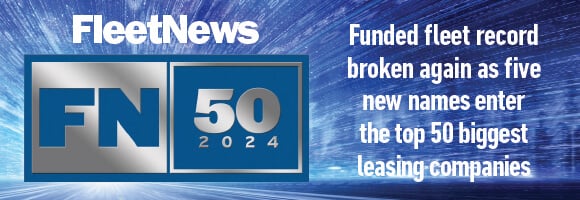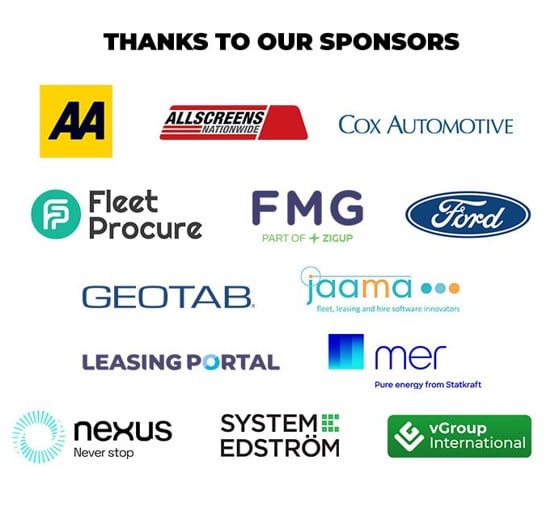This article has been taken from the FN50 2024 special report, providing insight into the UK’s biggest car, van and truck contract hire, leasing and fleet management companies. It is sponsored by The AA, Ford, Allscreens Nationwide, Cox Automotive, Fleet Procure, FMG, Geotab, Jaama, Leasing Portal, Mer, Nexus, System Edstrom and vGroup International.

Some have suggested that artificial intelligence (AI) could make people redundant.
Most experts, though, agree that, used correctly, AI will support and complement the fleet manager.
AI can remove more mundane tasks and provide data insight to free up a fleet manager’s time, enabling them to focus on strategic priorities armed with greater intelligence.
It is certainly not something to be feared.
Leasing companies have also started to deploy AI across their operations to provider greater support to fleet operators, although it should be noted that 19 FN50 providers have yet to establish the type of role it could play and are sitting back and watching market developments before committing investment.
The comments of Radius Vehicle Solutions are typical of those companies: “AI will play a massive part in the future of fleet management, (but) we will wait and see what progress software providers make in the next couple of years.”
Marshall Leasing managing director Greg McDowell says: “No immediate plans, but we are keeping this under review.
And Shane Coomber, Leasys marketing director, adds: “We are studying the compliance aspects before we can comment further on how we intend to use this.”
Cost of investment is also influencing the speed with which companies are willing to embrace and adopt AI, with Agility Fleet saying: “The OEMs and the dealers will be early adopters. The funders will want to introduce AI to speed up their process.
“We will look to piggyback as we aren’t big enough to invest heavily in this area.”
So what progress is being made, and how can AI support fleet operations? Alphabet has already integrated AI into multiple parts of its business.
It believes AI has the “potential to revolutionise fleet management” by making processes and decision-making more efficient, data-driven and customer-centric.
Chief sales officer Ian Turner says: “One of the key areas where we’re leveraging AI is in analytics and data interrogation.
By utilising advanced AI algorithms, we can process and analyse vast amounts of fleet data in real-time.
This enables us to uncover deeper insights into vehicle performance, driver behaviour and operational efficiencies, which might be overlooked with traditional analysis methods.
These insights enable fleet managers to make more informed decisions, optimise their fleets and reduce operational costs.”
Real-time quality assurance
AI is also helping Alphabet in real-time quality assurance.
Machine-learning models enable it to proactively predict maintenance needs before they become critical issues.
This will enhance vehicle uptime and safety, ultimately saving fleets money.
Turner adds: “AI-powered chatbots and virtual assistants can handle routine questions, freeing up our support teams to focus on more complex issues.
“This leads to a more efficient and satisfying customer experience.
“We’re also using AI to formulate offers based on consumer behaviour. By analysing customer interactions and preferences, AI permits us to tailor our services and offers to meet the specific needs of each business.
“This personalised approach bolsters customer satisfaction and fosters long-term relationships.
“As part of our commitment to a more digital experience, AI gives us the ability to make quicker decisions by providing immediate access to multiple data sources.
“This agility is crucial in today’s fast-paced business environment, where timely decisions can significantly impact success.”
Arval, meanwhile, has developed a five-year AI plan that is intended to enhance and influence the journey of its customers and drivers.
Managing director Lakshmi Moorthy believes AI models will “transform and optimise all our operations and will boost business growth within the next five years”.
Arval’s strategy has three pillars, she adds:
- Customer and employee experience: “Our ambition is to serve our customers 24/7 with the creation of an end-to-end virtual agent along with AI models helping us handle customer requests and feedback more efficiently.”
- Supporting customer offers: “Using AI to optimise marketing to ensure we are offering the right products and services at the right time in the customer journey. “Understanding customer needs better helps us offer more customised solutions.”
- Risk: “Using AI to improve fraud detection and further protect our customer data through industrialisation of data collection.”
It isn’t just the largest leasing companies that are investing in AI applications.
FN50 newcomer Drivalia, which sits at number 28, has embedded AI tech within its business, says commercial and operations director Duncan Green, “which already provides benefits to our colleagues, suppliers and customers largely as a decisioning tool in the credit process”.
It is also “keenly implementing” AI in other areas, he adds.
Inherent risks
AI is not necessarily all plain sailing, though, and does come with some inherent risks, according to VMS (Fleet Management).
“Implementing AI in critical areas like compliance and maintenance does come with its challenges and risks,” says the company.
“We are looking at the possibilities of where AI will fit in the management of our fleet, but are sceptical at this stage due to the high cost of error.
“We have been utilising this tech to improve efficiencies in other areas of our business to increase productivity.”
There has also been a consumer backlash against the growing prevalence of AI-based chatbots on websites which are only capable of responding to a limited menu of questions.
This will no doubt improve as the technology evolves, but some leasing companies are mindful of the importance of human interaction.
Ogilvie Fleet addresses those concerns head on, with sales and marketing director Nick Hardy stating: “Technology moves fast and the only option is to embrace it and use it as part of our business, while maintaining our stance that real human interaction is an essential tool in the provision of truly first-class customer service.”
Other business applications were also highlighted by leasing companies. Sogo Mobility expects to use AI in its marketing, end-of-contract and logistics activities, while Total Motion sees real opportunities in voice- and call-handling as well as sales analytics and performance marketing.
Ford Fleet Management intends to incorporate AI into its new FleetVision fleet management platform to assist with fleet utilisation, fuel efficiency, driver behaviour, route optimisation and predictive maintenance using telematics data.
Similarly, Grosvenor Contracts Leasing is developing a new fleet management system that will incorporate AI to generate efficiencies and streamline operations. Broker-turned-funder Rivervale, meanwhile, is already utilising AI to generate pricing, create quotations and documents “enabling us to streamline our processes and improve customer service”, says CEO Vince Pemberton.
Such is Holman Fleet’s belief in the potential of AI that it has several employees undertaking apprenticeships in AI technology.
It is already using AI and robotics within its service offering, supporting how it handles customers and analyses their data.
Novuna Vehicle Solutions has been using complex algorithms and machine-learning for some time and is starting to transition into AI, which it believes will provide key fleet oversights, including predictive fleet management.
This will be particularly important when aligning job and journey planning to the abilities of electric van and truck charging requirements.
“Efficient journey planning will require the inclusion of vehicle charging (and fuelling events for non-electric vehicles),” explains Paulo Larkman, Novuna fleet consultant.
He adds: “We are also investigating the use of AI for live driver feedback in terms of driving behaviours with a view to improve fleet safety, cut fleet costs and reduce carbon emissions.”
SG Fleet UK, which is current accessing AI, believes the possibilities are “immense”.
Commercial director Chris Salmon says: “We see AI-driven solutions in the supplier market using image analysis to help appraise vehicle condition and damage.
“Early trials have shown promise, suggesting these are useful in optimal conditions.
“It is clear that AI is set to play a pivotal role in the future of our industry, helping us deliver more efficient, safe and innovative solutions to our colleagues and customers alike.”

The leasing industry faces significant change as electric vehicle residual values continue their two-year decline, impacting profits and prompting calls for government support of the used EV market. The impact has been significant: after the record £2 billion profits seen by the FN50 in 2023, a £645 million reduction has been recorded this year.
Yet, this year’s FN50 also brings signs of robust growth. For the first time, funded fleet levels have surpassed 1.8 million vehicles, breaking a record set only a year ago. Both car and van totals saw increases, with the latter returning to growth after last year’s decline. Additionally, this year has been marked by change across the top 50 leasing companies with 5 new companies entering the list and 8 from last year appointing new leaders.
This dynamic landscape—driven by innovation in AI, fleet management, and emissions strategies—is explored in 2024's FN50 report, along with key industry challenges and growth areas.
It is sponsored by The AA, Ford, Allscreens Nationwide, Cox Automotive, Fleet Procure, FMG, Geotab, Jaama, Leasing Portal, Mer, Nexus, System Edstrom and vGroup International.
























Login to comment
Comments
No comments have been made yet.